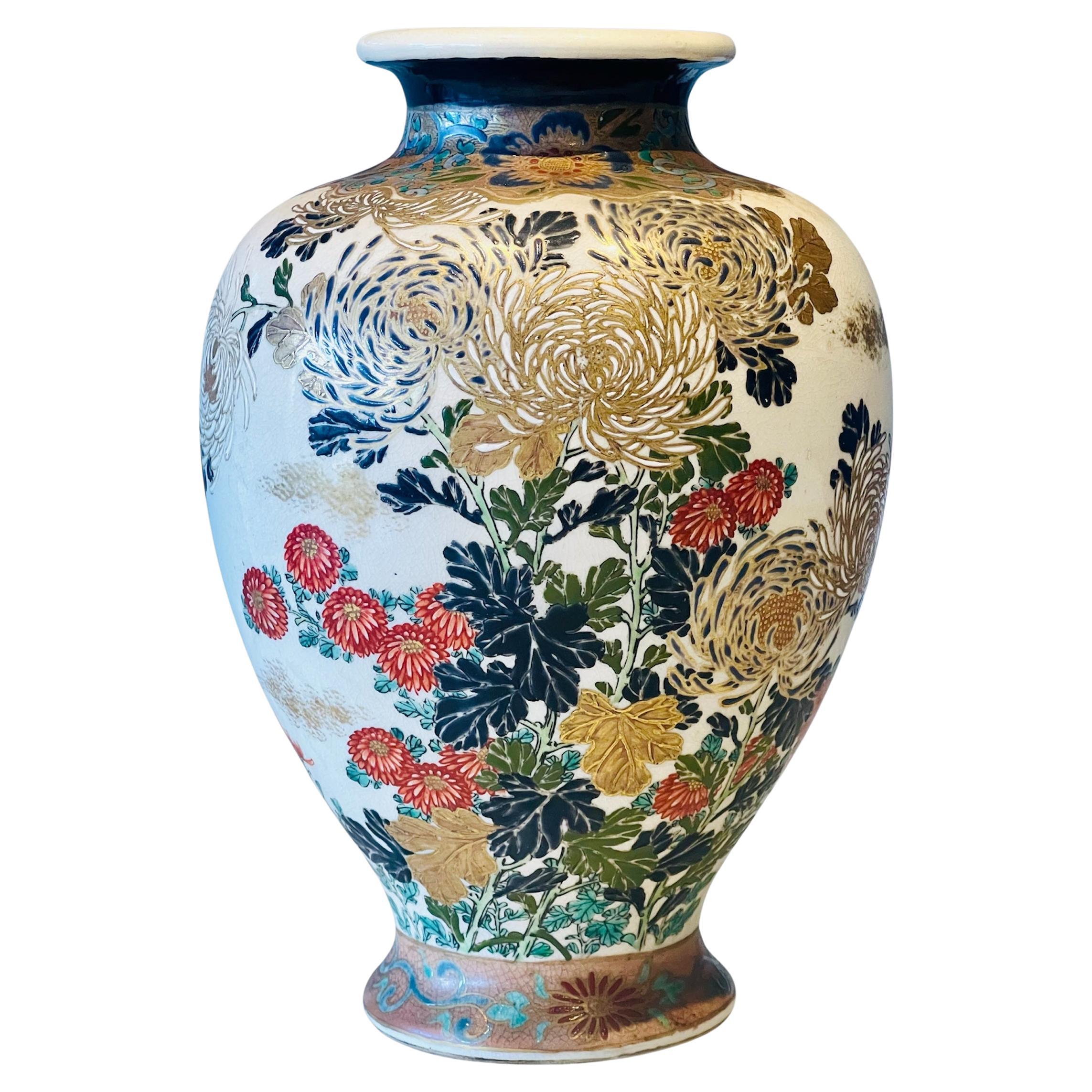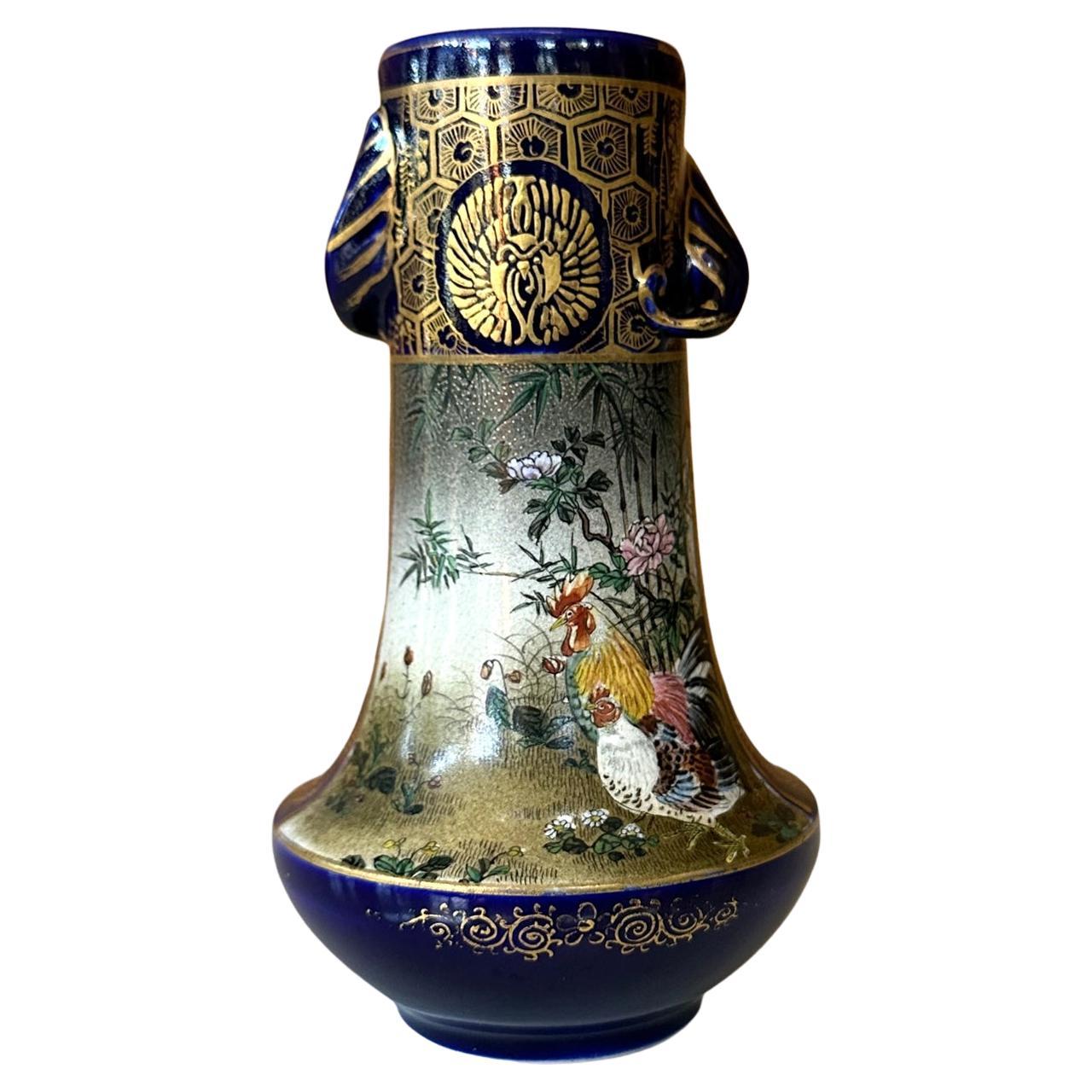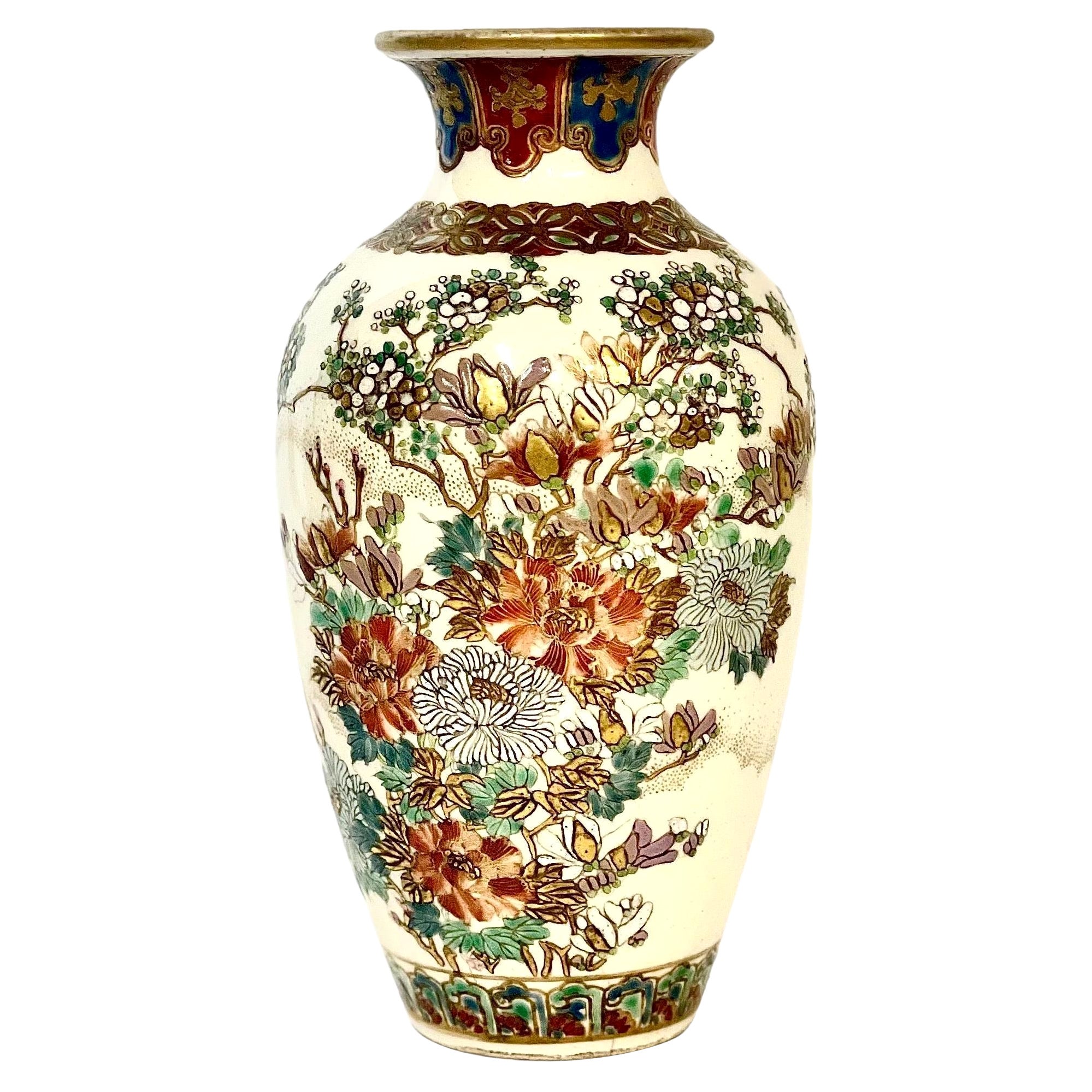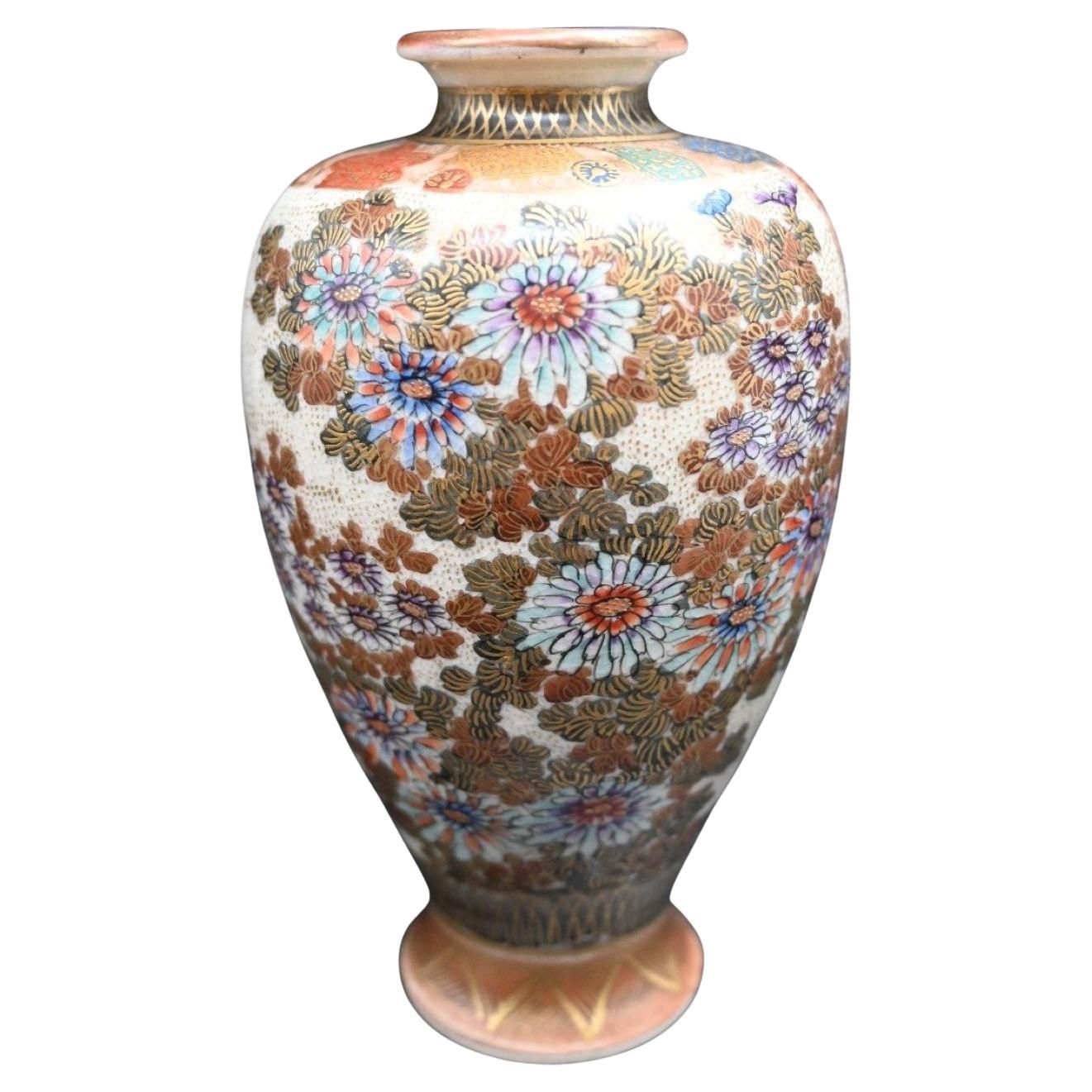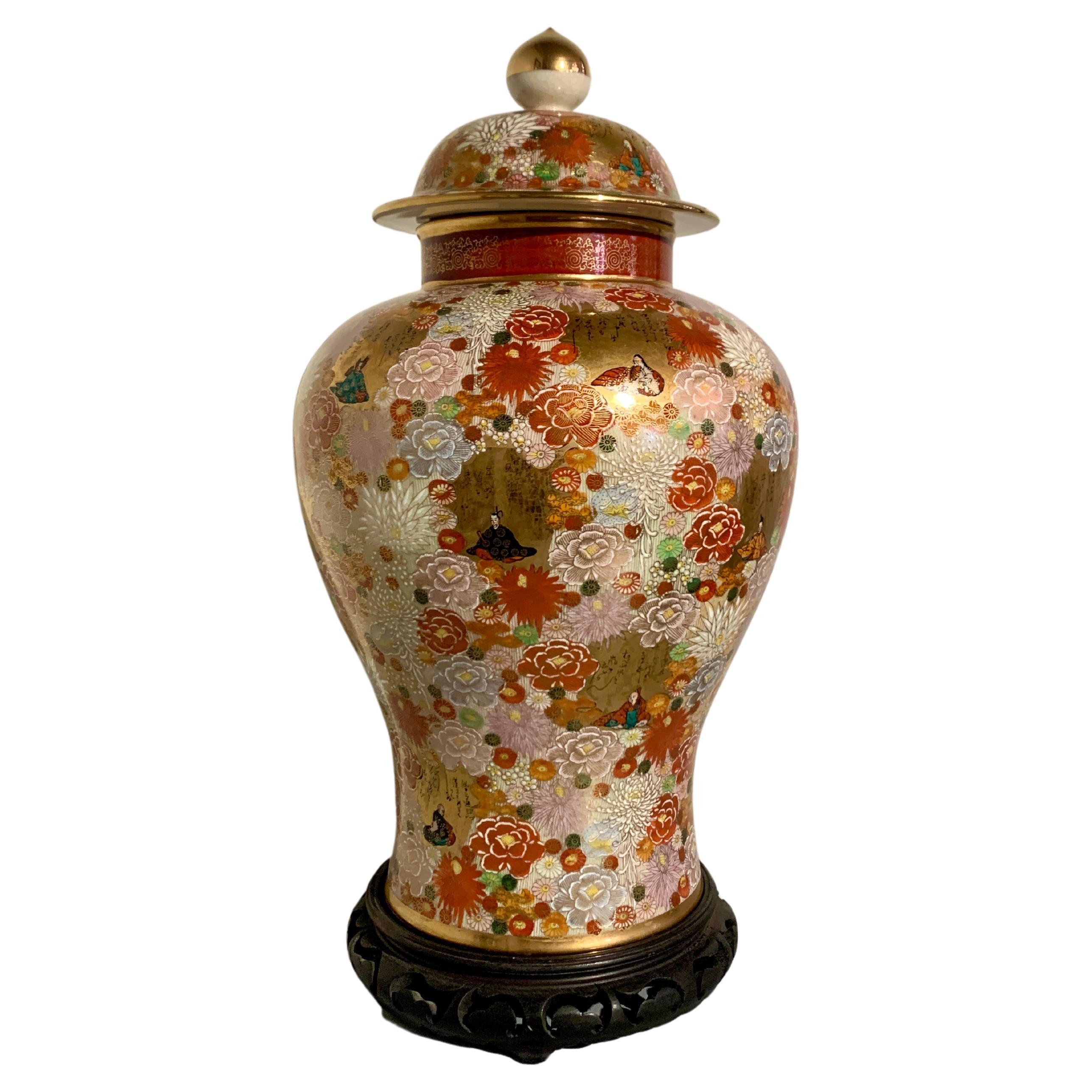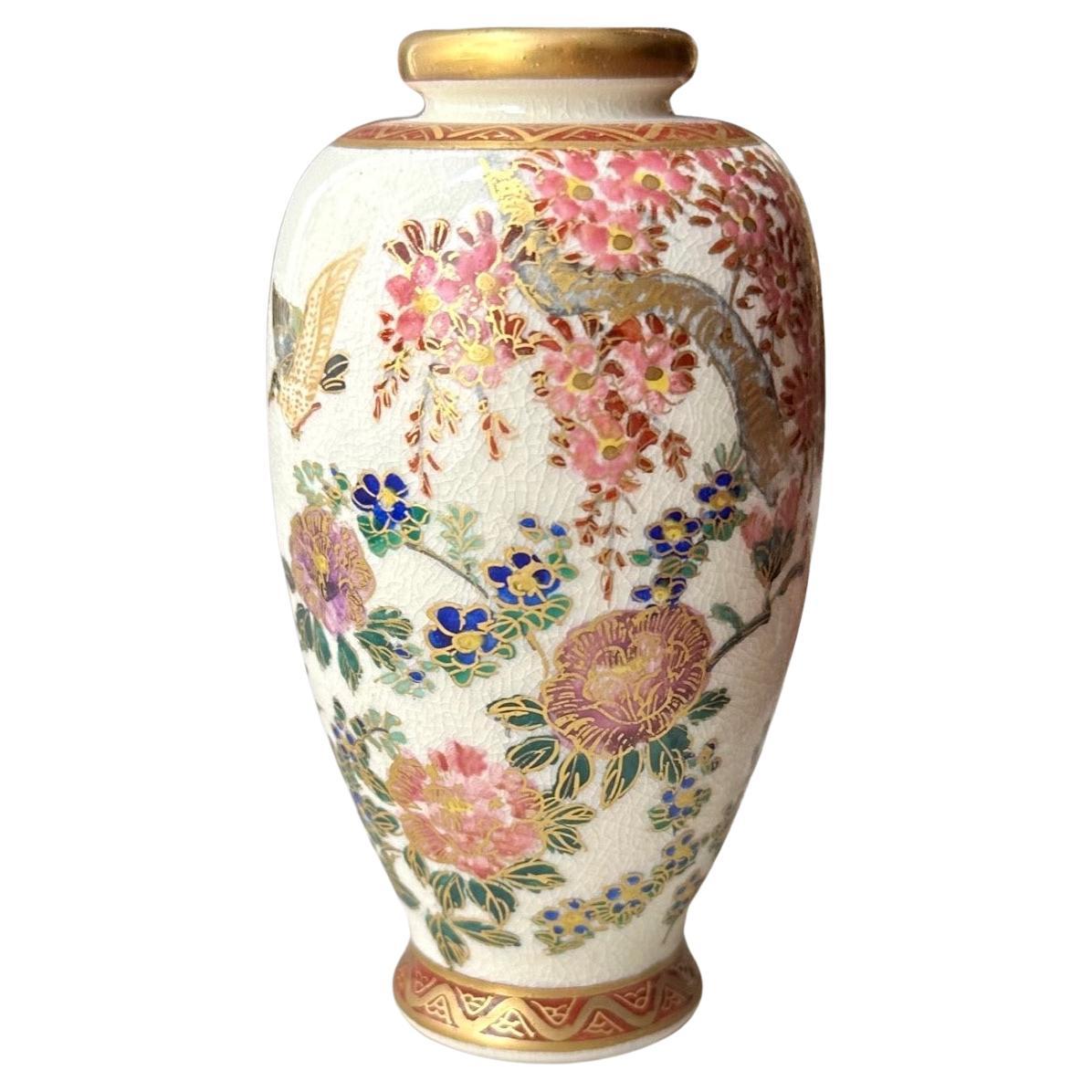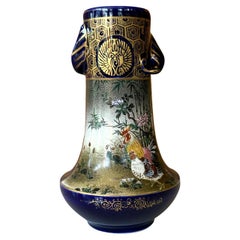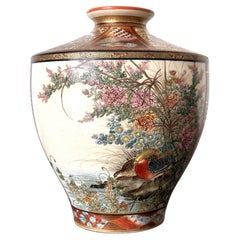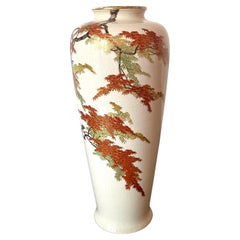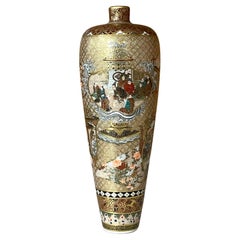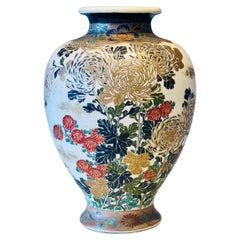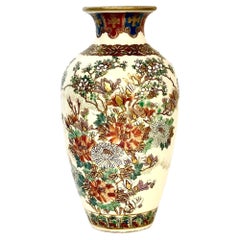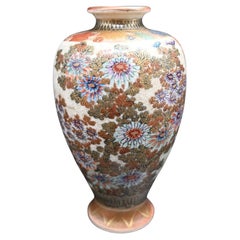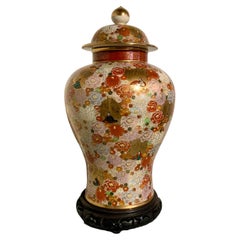Items Similar to Large Japanese Satsuma Ceramic Vase Kinkozan
Want more images or videos?
Request additional images or videos from the seller
1 of 21
Large Japanese Satsuma Ceramic Vase Kinkozan
$7,000
£5,344.47
€6,175.49
CA$9,826.67
A$10,952.85
CHF 5,746.59
MX$133,752.19
NOK 72,764.28
SEK 68,773.31
DKK 46,090.34
About the Item
A large Japanese ceramic vase from the end of Meiji period circa 1890-1910s by Kinkozan (1645-1927). One of the largest studio manufacturers of the export ceramics at the time based in Kyoto. In the typical style of satsuma made at the turn of 20th century, the vase is elaborately decorated with a rather unusual kinran-de (gold paint) and green enamel highlight on a mottled brown background. The painterly decoration depicts a large seasonal floral arrangement in a circular fashion. Besides the obviously superb craftsmanship, what sets this particular vase apart from many lower quality and mass-produced pieces is its tone-on-tone color pallet that is visually somber and the small and sensitive details that heralds the change of the seasons. When the viewer goes beyond the first casual glimpse of the blossom and foliage, one would notice that on the edges of certain leaves as well as along the stalks, there accumulates a very thin layer of the white dust that represents the frost. The flower in bloom are chrysanthemums. Despite of being splendid, they are the messengers of the autumn. The large lotus leaf was subtly rendered in a bended and slightly withered manner, just past its prime. Although the lotus is still in bloom, the prominent seed pod indicates it may be the last for the season. The sentimental capture of the change of the seasons is not unusual in Japanese art. This vase poetically represents such a subtle transition from summer to fall, perhaps depicting the very first frost.
The neck of the vase is also slightly unusual with two rolled rings that opens up to a flared mouth with inner grooves. From the shoulder upwards, it was decorated in four patterns including scrolling, fish scale, archaic cloud (Greek key) and foliage motifs. The base is also decorated with scrolling patterns in keeping with the traditional satsuma ware aethetic.
The base was drilled historically for lamp base through a signature that partially reads Signed "Japan, Kyoto, Made by Kinkozan". It retains an old paper sticker from gallery where it was originally purchased.
- Creator:Kinkozan (Manufacturer)
- Dimensions:Height: 19 in (48.26 cm)Diameter: 10 in (25.4 cm)
- Style:Meiji (Of the Period)
- Materials and Techniques:Ceramic,Enameled
- Place of Origin:
- Period:
- Date of Manufacture:1880-1910s
- Condition:Wear consistent with age and use. Minor surface wear in keeping with the age such as gilt rubbing around the rim and a couple of discolored spots on the glaze, mostly blended in. The base retains residuals of felt protection and an old gallery paper sticker as shown.
- Seller Location:Atlanta, GA
- Reference Number:1stDibs: LU945035653352
About the Seller
4.9
Platinum Seller
Premium sellers with a 4.7+ rating and 24-hour response times
Established in 2006
1stDibs seller since 2010
565 sales on 1stDibs
Typical response time: <1 hour
- ShippingRetrieving quote...Shipping from: Atlanta, GA
- Return Policy
Authenticity Guarantee
In the unlikely event there’s an issue with an item’s authenticity, contact us within 1 year for a full refund. DetailsMoney-Back Guarantee
If your item is not as described, is damaged in transit, or does not arrive, contact us within 7 days for a full refund. Details24-Hour Cancellation
You have a 24-hour grace period in which to reconsider your purchase, with no questions asked.Vetted Professional Sellers
Our world-class sellers must adhere to strict standards for service and quality, maintaining the integrity of our listings.Price-Match Guarantee
If you find that a seller listed the same item for a lower price elsewhere, we’ll match it.Trusted Global Delivery
Our best-in-class carrier network provides specialized shipping options worldwide, including custom delivery.More From This Seller
View AllFine Japanese Ceramic Satsuma Vase by Kinkozan
By Kinkozan
Located in Atlanta, GA
A miniature Japanese ceramic vase from the end of Meiji period circa 1880s- 1910s by Kinkozan (1645-1927). One of the largest studio manufacturers of the export ceramics at the time ...
Category
Early 20th Century Japanese Meiji Ceramics
Materials
Ceramic
Fine Japanese Satsuma Vase by Ryozan Okamoto for Yasuda Company Meiji Period
Located in Atlanta, GA
A finely decorated Japanese satsuma ceramic vase by Ryozan Okamoto (c.1820s-1910s) for Yasuda. Ryozan is the head artist working for Yasuda company, a Japanese ceramic makers and dea...
Category
Antique Early 1900s Japanese Meiji Ceramics
Materials
Ceramic
Japanese Satsuma Vase Yabu Meizan Meiji
By Yabu Meizan
Located in Atlanta, GA
A Satsuma baluster form vase from the studio of Yabu Meizan (birth name Yabu Masashichi; 1853-1934), who is one of the most celebrated and collectible Satsuma artists from Meiji Peri...
Category
Early 20th Century Japanese Meiji Ceramics
Materials
Ceramic
Exquisite Japanese Satsuma Vase by Seikozan
Located in Atlanta, GA
A miniature vase in elegant upright form reminiscent of the Chinese imperial Willow Leaf form made by Japanese studio Seikozan circa 1890-1910s (late Meiji Period). One of the many a...
Category
Antique 1880s Japanese Meiji Ceramics
Materials
Ceramic
Rare Large Vase with White Slip Inlay Makuzu Kozan Meiji Period
By Makuzu Kozan
Located in Atlanta, GA
A impressively large and unusual stoneware vase in an urn shape from the studio of Japanese Potter Makuzu Kozan, also known as Miyagawa Kozan (1842–1916), one of the most established and collected ceramist from Meiji Period. Born as Miyagawa Toranosuke, Kozan established his pottery studio in Yokohama circa 1870s and later became one of the appointed artist to the Japanese Imperial household. His work was exhibited in many international fairs that the Meiji government participated at the turn of the century and won many grand prizes.
This vase is dated to the end of Makuzu's life circa 1910-1916 based on similar work created around that time. After achieving domestic and international fame, Makuzu retired and handed the business to his son Hanzan in 1912. He dedicated his time to other selected projects that were more in tune with Japanese sensibility than export aesthetic. He made a group of stoneware pottery pieces inspired by Edo master like Ninsei and Kenzan as well as his own poetic creation. This piece is attributed to that period.
Standing of an impressive size, this vase is more like an urn, made with stoneware instead of porcelain. It was coated with a brown iron glaze with a slight translucent quality. Underglaze whit slips were used to draw low relief decoration of bamboo leaves that sparsely scatter on the surface. Slightly more elaborate scrolling vines and autumn flowers circles under the mouth rim. Same white slip inlay was used to sign the vase under the base. The whole effect of the piece is unusual. With its dark glaze in contrast with the sparse white decoration that is more abstract and geometric than realistic, it appears almost modern with an Art Deco flavor.
For stoneware urn and vase in the similar genre by Makuzu Kozan: see figure 113 on page 182 of "Sekai ni Aisa Reta ya Kimono" MIYAGAWA KOZAN MAKUZU...
Category
Vintage 1910s Japanese Japonisme Ceramics
Materials
Ceramic
Japanese Porcelain Vase with Relief Surface Makuzu Kozan
By Makuzu Kozan
Located in Atlanta, GA
A rare porcelain vase by Makuzu Kozan (1842-1916) circa 1870-81 (late Meiji period). The vase is dated to the earlier work from Kozan's studio during his early period (Takauki-ware p...
Category
Antique Late 19th Century Japanese Japonisme Ceramics
Materials
Ceramic
You May Also Like
A Large Imperial Satsuma Vase by Toshinobu, Meiji Period
Located in London, GB
A Large imperial Satsuma Vase
Signed Toshinobu (年信), Meiji Period (late 19th century)
Of baluster form with a flared rim, finely decorated in gilt and polychrome enamels on a crackl...
Category
Antique 19th Century Japanese Ceramics
Materials
Ceramic
Antique Japanese Taisho Satsuma Painted Vase
By Satsuma
Located in LA CIOTAT, FR
A petite and beautiful hand-decorated ceramic baluster vase, painted all around with traditional Japanese motifs, including native flora, birds and bamboo stems on a creamy glazed background. The colour palette is bold and bright, with highlights of green, red and blue, together with plentiful gilt relief...
Category
Early 20th Century Japanese Taisho Ceramics
Materials
Ceramic
High Quality Old Japanese Satsuma Earthenware Vase, ca 1900, Meiji period
By Satsuma
Located in Bilzen, BE
A rare antique handpainted Japanese Satsuma earthenware vase, signed
Fine quality
Good overall condition, no chips, cracks or restorations
Height 14 cm
Category
Early 20th Century Japanese Meiji Vases
Materials
Earthenware
Large Japanese Satsuma Covered Vase, Showa Period, Mid 20th Century, Japan
Located in Austin, TX
A very large and exuberantly decorated Japanese Satsuma millefleur covered vase, marked Satsuma, Showa period, mid 20th century, Japan.
The large vase of attractive baluster form, with a slightly splayed foot, narrow waist, and tapered body with high shoulders and short neck. The vase topped by a domed cover with a large finial shaped like a hoju, the wish fulfilling jewel.
The vase decorated all over in a dense field of flowering blossoms - peony, lotus, and chrysanthemum - in a design known as millefleur, or a thousand flowers. The flowers freely and cheerfully painted in various colors of red, white, orange, green, blue and yellow, with raised white enamels...
Category
Mid-20th Century Japanese Showa Ceramics
Materials
Stoneware
Meiji Period Diminutive Satsuma Baluster Vase.
By Satsuma
Located in Vero Beach, FL
Meiji Period Diminutive Satsuma Baluster Vase.
This Japanese Satsuma vase from the late Meiji period is hand painted and gilt decorated with a Japanese landscape in exquisite detail...
Category
20th Century Japanese Meiji Ceramics
Materials
Porcelain
$680 Sale Price
20% Off
A Fine Japanese Satsuma vase signed by Ryokuzan. Meiji period
Located in London, GB
A exquisite Satsuma vase signed by Ryokuzan.
Meiji Era.
Of a slender ovoid shape featuring intricate hand-painted designs and delicate gilded accents.
The vase is adorned with...
Category
Antique 19th Century Japanese Ceramics
Materials
Ceramic, Porcelain
More Ways To Browse
Large Scale Ceramics
Japanese Painted Ceramic Vase
Japanese Scroll Flower
Antique Fish Scale
Antique Fish Scaler
Ceramic Cloud
Antique Japanese Rings
Large Ceramic Fish
Antique Fish Vase
Ceramic And Gold Ring
Antique Ceramic Fish
Antique Japanese Fish
White Ceramic Fish
Green Fish Ceramic
20th Century Satsuma Vase
Early Satsuma
Greek Key Vases
Ceramic Lamp Leaf
